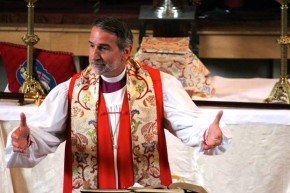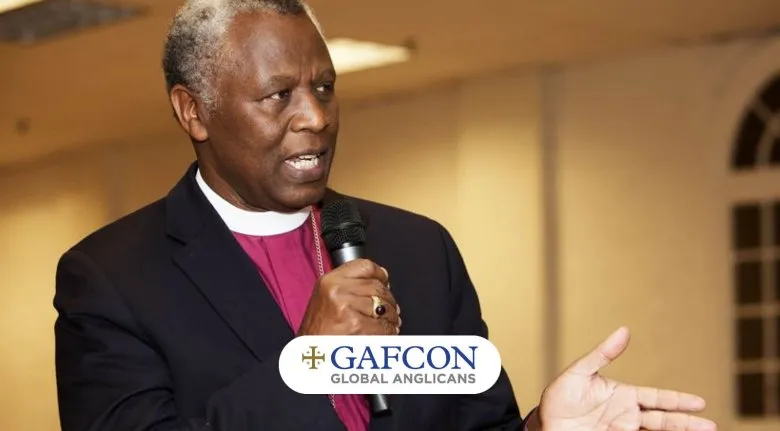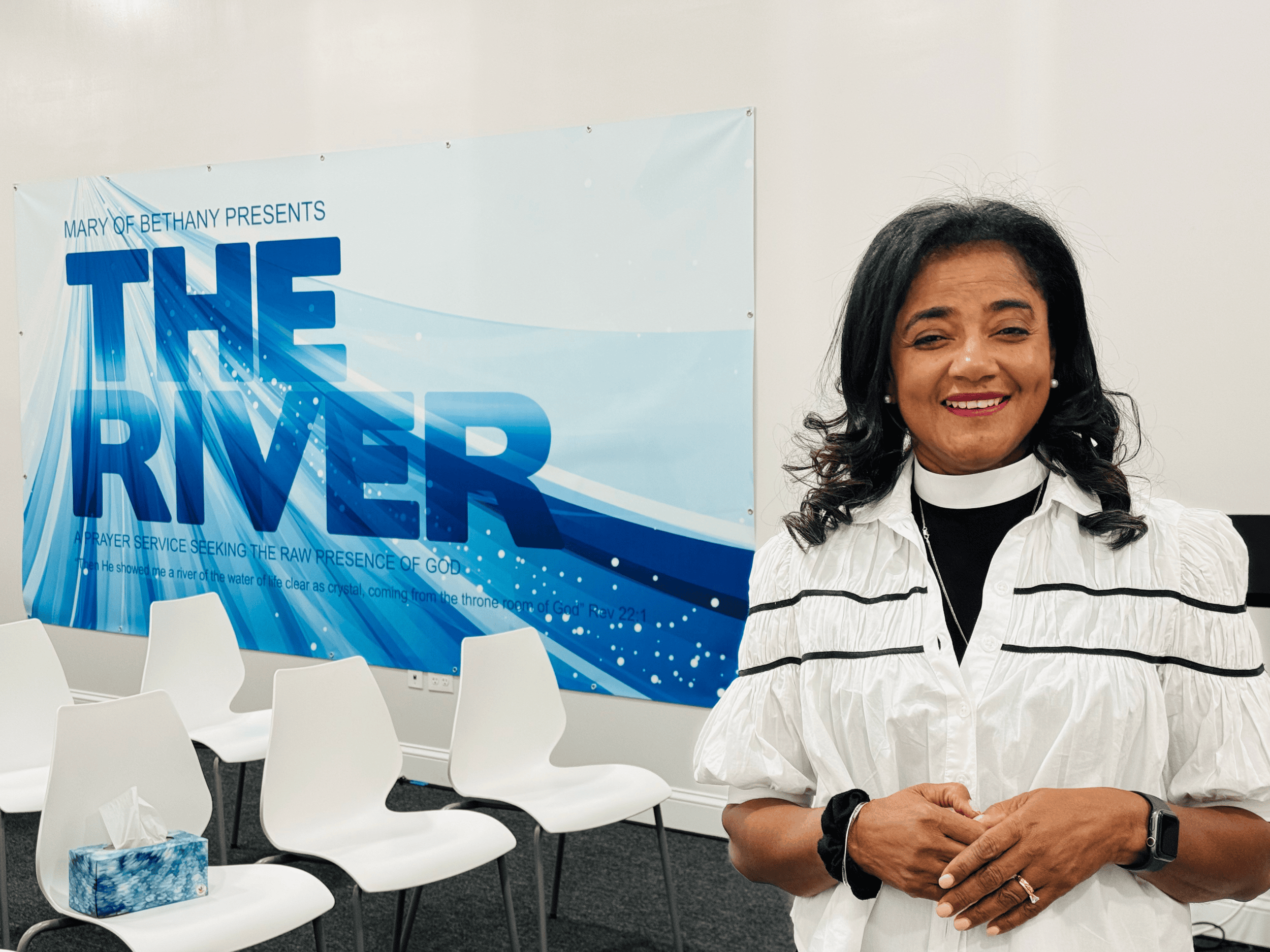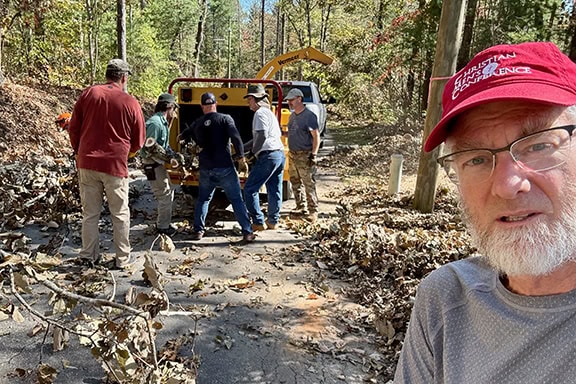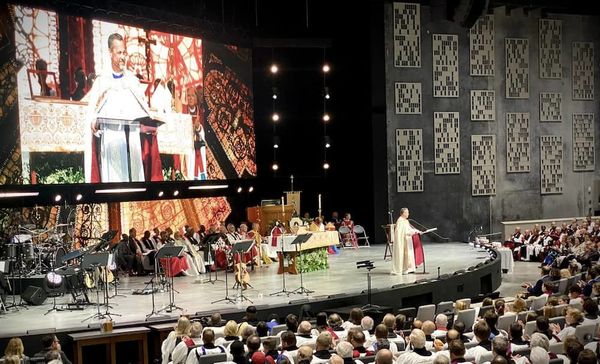The following are excerpts from the interview by Jacob Stubs for Juicy Ecumenicalism, the official blog of the Institute on Religion & Democracy. Read the interview in full here.
Q: Can you tell us a brief version of your testimony? How did the situation in which you grew up shape your call to pastoral ministry? How has it shaped your social vision for the Anglican Church?
Abp. Beach: Well, I think the simplest way is, I was raised in a broken home. Out of that brokenness, I got involved in the Baptist church where I received Jesus as my Lord and Savior. I then went off to high school and got involved in the ministry of Young Life, which really helped shape me and get my relationship with the Lord on track.
This influenced me in many different ways. Because I was in and out of so many different schools, I learned how to relate to many people. So, when people are walking in a crowd or seeing people come into our church that I don’t know, it’s not difficult for me to meet them.
I think another aspect is that it has given me a sensitivity to the brokenness in our families and the need of the church, in the name of Jesus, try to minister and care for the broken people in our midst. Of course, in the culture, that brokenness exists as well. And so, trying to have a heart for people in pain and bringing God’s healing touch through Jesus, I think that’s a big part of how the situation in which I grew up shaped me.
Q: Who are your models or inspirations for your ministry as both a priest and bishop?
Abp. Beach: To have one person is really impossible. I think one modern person I would say that’s had a good impact is a man by the name of Sam Shoemaker. He was an Episcopal priest in Pittsburgh, and was really behind the emphasis of “let’s let Pittsburgh be known more for God than for steel.” He was a spiritual leader who created a lot of social ministries and family ministries to reach people with the Gospel. He was the person who was behind AA (Alcoholics Anonymous).
There’s a book he wrote and a poem out of that book called I Stand at the Door. The whole thesis is about a person who comes to the Lord and into the door of the House of God. The poem talks about all of these vast rooms in the House of God. Some go down the theological wing, and some get involved in ecstatic experiences. But, Shoemaker said, ‘My place is by the door. I stand near the door.’
This theme weaves throughout the whole poem: ‘To help people put their hands on the doorknob. To help people get in the door. To help people find their way into the House of God.’ I would say this theme is something that’s at the center of all of my ministry—helping people find the Lord wherever they may be.
Q: What thinker (apart from the Bible) has played the biggest role in the development of your thought, both pastorally and in terms of your vision of the social/political role of the Church?
Abp. Beach: Again, when you talk theologically, everybody from the Apostles, and the Apostle Paul – Romans is probably one of the best theological works. But, outside of the Bible, there are the Church Fathers. A lot of the Anglican Reformers really impacted my thinking. Again, a modern person would be John Stott – his Bible expositions and his ability to explain hard things in simple clarity has spoken to me again and again and again.
Q: How would you define the Anglican identity”? What does ACNA distinctively have to offer both Christians and non-Christians in America? Should Anglicans have more of a “confessional” identity? Is the new catechism an attempt to develop a more confessional identity, especially given Dr. Packer’s recommendation to teach it in ACNA parishes at the Provincial Assembly?
Abp. Beach: Let me answer that last question first. I think a lot of us get in trouble when we think we have the Anglican identity, because we’re a diverse lot. From our formation days back in the Reformation, we’ve been a diverse group. Currently—and this is something I think that’s very distinctive about who we are— we are a group that is Anglo-Catholic, Evangelical, and Charismatic. Some call that the ‘Three Streams,’ and that’s a simple way of explaining it. But, even some of our most Anglo-Catholic folks would be more charismatic than I am. All of us tend to have those three streams somewhere in our mix.
I think that’s very unique for American Christianity today. All of us have our core; my core would be evangelical. Although I have the other two pieces, my core or default is evangelical. But, these streams enable us to bring the richness of the breadth of Christianity, and it’s truly powerful when these streams are together.
Q: Should Anglicans have more of a “confessional” identity? Is the new catechism an attempt to develop a more confessional identity, especially given Dr. Packer’s recommendation to teach it in ACNA parishes at the Provincial Assembly?
Abp. Beach: Anglicans are pretty confessional already. If you say Morning Prayer and Evening Prayer, we confess the Apostles’ Creed. On Sundays, we confess the Nicene Creed. The Anglican Church in North America is a product of the Jerusalem Declaration, which is a very confessional statement. I would say we’re already very confessional. The purpose of the catechism is to introduce Christianity to a culture that is no longer a Christian culture, and the intent is to bring the basic teaching of the faith this culture.
Q: Does this catechism represent a more ‘missional outlook,’ would you say?
Abp. Beach: More than any other catechism we’ve had in history, our catechism very missional. All of the other catechisms were written for cultures that were already Christian. Ours begins by describing how you even become a Christian. And then, all throughout it, there are references to the faith and prayers to pray. With the online version, there will be links to deeper articles. Again, the intent is to be missional. But at the same time, we want Anglicans to be disciples. We want Anglicans who understand not only what we believe, but why we believe it.
Q: Are ACNA’s trial liturgies an attempt to bring about more unity in worship? How does this relate to the theological diversity found in ACNA?
Abp. Beach: I think the liturgies are an attempt to offer another resource to the Church, not really mandate a specific liturgy we have to use. Everybody is free to use all of the other liturgies that are out there. But, with our trial liturgies, we’re attempting to bring a lot of the historic richness of our heritage into contemporary language. We have some contemporary liturgies that a lot of people believe miss out on the depth our theological heritage. So, the Texts for Common Prayer represents an attempt to capture our heritage. We’re still working on it; we haven’t arrived yet. But, that’s the attempt.
Q: In a Q&A at the Provincial Assembly, you were asked how you will be treating the issue of women’s ordination. As bishop of the Diocese of the South, you did not ordain women. In your response during the Q&A, you demonstrated great charity toward both sides of the debate. Would a voluntary moratorium on the ordination of women help ease tensions until the task force finishes its work? Does the question of women’s ordination show the limit of charity in theological disagreement?
Abp. Beach: First, let me say that I think a voluntary moratorium would actually not ease the tension. I think it would pour gasoline in the fire. Part of that is, in our constitution and canons, we have left the issue of women’s ordination for each diocese to decide. A lot of people came into the ACNA in good faith that their perspective – including those who ordain women—would be protected and guarded. And, people who believe in ordaining women hold their position by conscience and can Biblically argue it, although I disagree with them. This issue is a very important thing to them, and so I think it would create a lot of tension.
A lot of the women priests in ACNA have stood side-by-side with a number of our bishops and clergy who are against women’s ordination when they were in The Episcopal Church. These women argued for the right of these bishops to have the freedom to not ordain women. Women’s ordination is a very complicated issue, because we’ve got people who have given their heart and soul on each side. And, these people are sincere; they’re godly. And so, I think a voluntary moratorium on women’s ordination would add so many more flames to the fire.
As far as the limit of charity, I think women’s ordination does the opposite; I think it gives us the ability to be charitable. Because, here you have someone who you, in your core, disagree with on an issue; and yet, they’re a believer in Jesus. How am I going to treat them? How am I going to act toward them? How am I going to respond to them? I think women’s ordination gives us the opportunity to be charitable.
Q: The ACNA has a Task Force on Religious Freedom and Islam. I know that certain groups of Roman Catholic monks have worked with non-radicalized Islamic sects. Certainly, radicalized Islamic groups and states such as ISIS do pose a grave threat to Christian’s religious freedom in the Middle East; however, do you see possible avenues of work with non-radicalized Islamic groups?
Abp. Beach: I’m sure there will always be times where issues of human rights and religious freedom that we can work with non-radicalized groups as you describe. But, the core of our faiths are so different, we will always want to share Jesus with them, because He is the Way for salvation. The issue is how far along we will want to work together.
Right now, because of what we’re seeing in Mosul and in other parts of Iraq and in Syria— the violence that’s being done against Christians—we would hope that some of these folks would be willing to stand up, but the violence is so horrific that nobody is willing to take a stand. In the uprisings we saw in Egypt, there were a number of Islamic groups that started attacking Christians, and many Muslims – there’s actually pictures in some places—formed circles around the Christians and protected them. In some places in the Middle East, there’s always been a good relationship, but because of the radicalization of Islam, that’s becoming more and more difficult to do.
Read the entire interview here.
Jacob Stubbs is a M.A.R. student at Yale Divinity School. Previously, he has researched at a state-level policy organization in Atlanta, GA, and has served as a Fellow at the John Jay Institute. He first discovered the Anglican Tradition at St. Andrew’s Anglican Church in Rome, GA. Follow him on Twitter @theweeklystubb.
